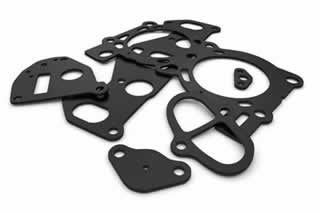
Gaskets play an important role in the function of many machines. From lathes and milling machines to forklifts and automobiles, they allow for a leak-proof mating surface between two or more parts. Machines, of course, often contain fluids or gases. To prevent these fluids or gases from escaping, gaskets are used. While all gaskets are designed to create a leak-proof mating surface, they are available in different materials.
Acrylic
Acrylic is a common material of which gaskets are made. As you may know, acrylic is a type of a thermoplastic that’s lightweight, durable and strong. With these properties, it’s an attractive choice of material for use in the construction of gaskets. Acrylic gaskets exhibit all these properties, allowing them to be used in a variety of sealing applications for machines.
Sponge Rubber
You can find gaskets made of sponge rubber. Foam rubber is a special type of rubber that contains a foaming compound. They are typically created using a mixture of synthetic or natural rubber that’s mixed with a foaming compound. The presence of this foaming compound changes the physical properties of rubber. Sponge rubber is softer and more elastic than standard synthetic or natural rubber. With that said, sponge rubber is still strong and durable, so it’s able to prevent fluids and gases from leaking.
Aluminum
Some gaskets are made of aluminum. Aluminum is an inexpensive and versatile material that’s become synonymous with gaskets. Countless consumer and commercial gaskets are made of aluminum. Like acrylic and sponge rubber gaskets, aluminum gaskets can prevent fluids and gases from leaking. Aluminum gaskets, however, offer a higher level of protection against corrosion than their counterparts.
Ceramic Paper
Another material of which gaskets are made is ceramic paper. Also known as ceramic fiber paper, it’s a type of refractory material that consists primarily of aluminum-silicate fiber. Ceramic paper gaskets support thin and small sizes. Gaksets, of course, must be sized to the fit the machine with which they are used. With ceramic paper, gaskets can be designed in thin and small sizes for machines.
Polyurethane
There are polyurethane gaskets as well. Polyurethane is a synthetic material consisting of compounds that are joined together by carbamate units. Scientic jargon aside, it’s a strong and durable material that’s ideal for use in gaskets. Polyurethane gaskets last a long time while offering a high level of protection against leaks. At the same time, they are resistant to cracking, warping and corrosion.
